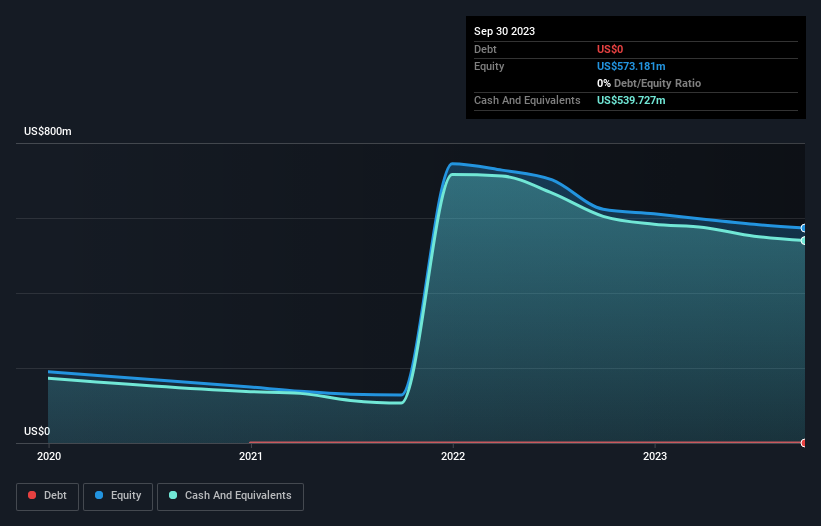- United States
- /
- Interactive Media and Services
- /
- NYSE:NXDR
We're Hopeful That Nextdoor Holdings (NYSE:KIND) Will Use Its Cash Wisely
Even when a business is losing money, it's possible for shareholders to make money if they buy a good business at the right price. For example, although software-as-a-service business Salesforce.com lost money for years while it grew recurring revenue, if you held shares since 2005, you'd have done very well indeed. But while history lauds those rare successes, those that fail are often forgotten; who remembers Pets.com?
Given this risk, we thought we'd take a look at whether Nextdoor Holdings (NYSE:KIND) shareholders should be worried about its cash burn. For the purposes of this article, cash burn is the annual rate at which an unprofitable company spends cash to fund its growth; its negative free cash flow. We'll start by comparing its cash burn with its cash reserves in order to calculate its cash runway.
View our latest analysis for Nextdoor Holdings
When Might Nextdoor Holdings Run Out Of Money?
A cash runway is defined as the length of time it would take a company to run out of money if it kept spending at its current rate of cash burn. As at September 2023, Nextdoor Holdings had cash of US$540m and no debt. Looking at the last year, the company burnt through US$65m. Therefore, from September 2023 it had 8.3 years of cash runway. Importantly, though, analysts think that Nextdoor Holdings will reach cashflow breakeven before then. If that happens, then the length of its cash runway, today, would become a moot point. The image below shows how its cash balance has been changing over the last few years.

How Well Is Nextdoor Holdings Growing?
Some investors might find it troubling that Nextdoor Holdings is actually increasing its cash burn, which is up 5.8% in the last year. In light of that, the flat year on year operating leverage is a bit off-putting. In light of the data above, we're fairly sanguine about the business growth trajectory. While the past is always worth studying, it is the future that matters most of all. So you might want to take a peek at how much the company is expected to grow in the next few years.
Can Nextdoor Holdings Raise More Cash Easily?
While Nextdoor Holdings seems to be in a fairly good position, it's still worth considering how easily it could raise more cash, even just to fuel faster growth. Issuing new shares, or taking on debt, are the most common ways for a listed company to raise more money for its business. Many companies end up issuing new shares to fund future growth. By comparing a company's annual cash burn to its total market capitalisation, we can estimate roughly how many shares it would have to issue in order to run the company for another year (at the same burn rate).
Nextdoor Holdings' cash burn of US$65m is about 10% of its US$628m market capitalisation. Given that situation, it's fair to say the company wouldn't have much trouble raising more cash for growth, but shareholders would be somewhat diluted.
How Risky Is Nextdoor Holdings' Cash Burn Situation?
Even though its increasing cash burn makes us a little nervous, we are compelled to mention that we thought Nextdoor Holdings' cash runway was relatively promising. Shareholders can take heart from the fact that analysts are forecasting it will reach breakeven. Considering all the factors discussed in this article, we're not overly concerned about the company's cash burn, although we do think shareholders should keep an eye on how it develops. Taking an in-depth view of risks, we've identified 2 warning signs for Nextdoor Holdings that you should be aware of before investing.
Of course Nextdoor Holdings may not be the best stock to buy. So you may wish to see this free collection of companies boasting high return on equity, or this list of stocks that insiders are buying.
Valuation is complex, but we're here to simplify it.
Discover if Nextdoor Holdings might be undervalued or overvalued with our detailed analysis, featuring fair value estimates, potential risks, dividends, insider trades, and its financial condition.
Access Free AnalysisHave feedback on this article? Concerned about the content? Get in touch with us directly. Alternatively, email editorial-team (at) simplywallst.com.
This article by Simply Wall St is general in nature. We provide commentary based on historical data and analyst forecasts only using an unbiased methodology and our articles are not intended to be financial advice. It does not constitute a recommendation to buy or sell any stock, and does not take account of your objectives, or your financial situation. We aim to bring you long-term focused analysis driven by fundamental data. Note that our analysis may not factor in the latest price-sensitive company announcements or qualitative material. Simply Wall St has no position in any stocks mentioned.
About NYSE:NXDR
Nextdoor Holdings
Operates a neighborhood network that connects neighbors, businesses, and public agencies in the United States and internationally.
Flawless balance sheet and slightly overvalued.
Similar Companies
Market Insights
Community Narratives




